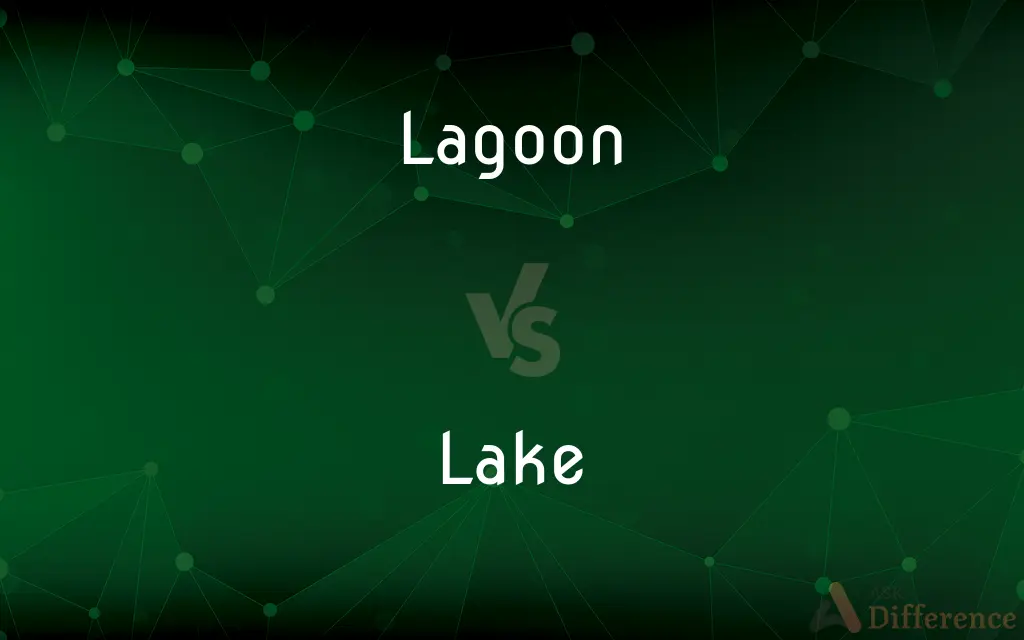Lagoon vs. Lake — What's the Difference?
Edited by Tayyaba Rehman — By Fiza Rafique — Updated on September 25, 2023
A lagoon is a shallow body of water separated from a larger body of water, often the sea, by a barrier such as a sandbar or coral reef. A lake is an inland body of water, usually freshwater, that can vary greatly in size and depth.

Difference Between Lagoon and Lake
Table of Contents
ADVERTISEMENT
Key Differences
A lagoon is typically a shallow, often saline or brackish body of water that is separated from a larger body of water, most commonly the sea or ocean, by some form of barrier such as a sandbar, coral reef, or barrier island. Lagoons often exist along coastlines and are usually more saline than freshwater but less so than seawater. In contrast, a lake is an inland body of water, usually freshwater, formed by various geological processes like glacial action, tectonic activity, or volcanic eruptions.
While lagoons are generally limited to coastal regions, lakes can be found all over the world, including high mountains and arid deserts. The primary source of water for lagoons is often the sea or ocean they are connected to, while lakes can be fed by rivers, streams, or underground springs. Both lagoons and lakes can support a diverse range of flora and fauna but differ in their ecosystems due to variations in salinity and depth.
From a grammatical standpoint, both "lagoon" and "lake" are singular nouns, with their respective plural forms being "lagoons" and "lakes." Although the two terms are sometimes used interchangeably in casual conversation, their specific meanings in the fields of geography and ecology make them distinct. Lagoons are often featured in tropical settings, while lakes are more versatile in terms of geographical distribution.
In terms of recreational activities, both lagoons and lakes offer a variety of options such as swimming, boating, and fishing. However, the type of fish and aquatic life you might encounter would differ between the two. For instance, lagoons may contain more marine species due to their connection to larger bodies of water, while lakes primarily contain freshwater species.
Comparison Chart
Location
Coastal
Inland
ADVERTISEMENT
Salinity
Often brackish or saline
Usually freshwater
Depth
Generally shallow
Varies, can be deep
Source of Water
Mainly from the sea or ocean
Rivers, streams, springs
Grammatical Number
Singular noun, plural "lagoons"
Singular noun, plural "lakes"
Compare with Definitions
Lagoon
Lagoon is separated from a larger body of water.
A sandbar divides the lagoon from the open sea.
Lake
Lake is an inland body of water.
The city is located next to a large lake.
Lagoon
Lagoon is a shallow coastal water body.
The island is surrounded by a beautiful lagoon.
Lake
Lake is often fed by rivers or streams.
A small river empties into the lake.
Lagoon
Lagoon often has brackish water.
The water in the lagoon is slightly salty.
Lake
Lake usually contains freshwater.
The lake provides drinking water to the nearby town.
Lagoon
Lagoon can be created by coral reefs.
The coral reef has created a tranquil lagoon.
Lake
Lake can support diverse ecosystems.
The lake is home to various species of fish and birds.
Lagoon
Lagoon is typically rich in marine life.
Coral reefs in the lagoon are teeming with fish.
Lake
A lake is an area filled with water, localized in a basin, surrounded by land, apart from any river or other outlet that serves to feed or drain the lake. Lakes lie on land and are not part of the ocean, although like the much larger oceans, they form part of Earth's water cycle.
Lagoon
A lagoon is a shallow body of water separated from a larger body of water by a narrow landform, such as reefs, barrier islands, barrier peninsulas, or isthmuses. Lagoons are commonly divided into coastal lagoons and atoll lagoons.
Lake
A large area of water surrounded by land
Lake Victoria
Boys were swimming in the lake
Lagoon
A shallow body of water, especially one separated from a sea by sandbars or coral reefs.
Lake
An insoluble pigment made by combining a soluble organic dye and an insoluble mordant.
Lagoon
A shallow artificial pond used for treating or storing liquid waste material or for collecting flood waters.
Lake
A large inland body of fresh water or salt water.
Lagoon
A shallow body of water separated from deeper sea by a bar.
Lake
A scenic pond, as in a park.
Lagoon
A shallow sound, channel, pond, or lake, especially one into which the sea flows; as, the lagoons of Venice.
Lake
A large pool of liquid
A lake of spilled coffee on my desk.
Lagoon
A lake in a coral island, often occupying a large portion of its area, and usually communicating with the sea. See Atoll.
Lake
A pigment consisting of organic coloring matter with an inorganic, usually metallic base or carrier, used in dyes, inks, and paints.
Lagoon
A body of water cut off from a larger body by a reef of sand or coral
Lake
A deep red.
Lake
A large, landlocked stretch of water or similar liquid.
Lake
A large amount of liquid; as, a wine lake.
Lake
A small stream of running water; a channel for water; a drain.
Lake
(obsolete) A pit, or ditch.
Lake
(obsolete) An offering, sacrifice, gift.
Lake
(dialectal) Play; sport; game; fun; glee.
Lake
(obsolete) A kind of fine, white linen.
Lake
In dyeing and painting, an often fugitive crimson or vermillion pigment derived from an organic colorant (cochineal or madder, for example) and an inorganic, generally metallic mordant.
Lake
In the composition of colors for use in products intended for human consumption, made by extending on a substratum of alumina, a salt prepared from one of the certified water-soluble straight colors.
The name of a lake prepared by extending the aluminum salt prepared from FD&C Blue No. 1 upon the substratum would be FD&C Blue No. 1--Aluminum Lake.
Lake
(obsolete) To present an offering.
Lake
To leap, jump, exert oneself, play.
Lake
To make lake-red.
Lake
A pigment formed by combining some coloring matter, usually by precipitation, with a metallic oxide or earth, esp. with aluminium hydrate; as, madder lake; Florentine lake; yellow lake, etc.
Lake
A kind of fine white linen, formerly in use.
Lake
A large body of water contained in a depression of the earth's surface, and supplied from the drainage of a more or less extended area.
Lake
To play; to sport.
Lake
A body of (usually fresh) water surrounded by land
Lake
A purplish red pigment prepared from lac or cochineal
Lake
Any of numerous bright translucent organic pigments
Lake
Lake can be of varying depths.
The lake is deep enough for motorboats.
Common Curiosities
Where are lagoons commonly found?
Lagoons are commonly found along coastlines.
Are lagoons saltwater or freshwater?
Lagoons often have brackish or saline water.
How deep is a typical lagoon?
Lagoons are generally shallow bodies of water.
What is a lake?
A lake is an inland body of usually freshwater water that can vary greatly in size and depth.
How do lakes form?
Lakes can form through geological processes like glacial action, tectonic shifts, and volcanic activity.
Can you fish in a lagoon?
Yes, you can often fish in a lagoon, usually for marine species.
What is a lagoon?
A lagoon is a shallow body of water separated from a larger body, often the sea, by a barrier like a sandbar.
Where can lakes be located?
Lakes can be found in various environments including mountains, plains, and deserts.
Are lakes saltwater or freshwater?
Lakes are generally freshwater bodies.
Are lakes safe for swimming?
Lakes are often used for swimming but water quality should be checked.
What separates a lagoon from a larger body of water?
A lagoon is usually separated by a natural barrier like a sandbar or coral reef.
Can you fish in a lake?
Yes, lakes are often rich fishing grounds for freshwater species.
Are lagoons safe for swimming?
Lagoons can be safe for swimming but it depends on the water quality and local marine life.
How deep can a lake be?
Lakes can vary in depth, with some being extremely deep.
Can both lagoons and lakes support plant life?
Yes, both lagoons and lakes can support a variety of plant life, although the species may differ due to salinity and depth.
Share Your Discovery

Previous Comparison
Arrogance vs. Humility
Next Comparison
Moe vs. MowAuthor Spotlight
Written by
Fiza RafiqueFiza Rafique is a skilled content writer at AskDifference.com, where she meticulously refines and enhances written pieces. Drawing from her vast editorial expertise, Fiza ensures clarity, accuracy, and precision in every article. Passionate about language, she continually seeks to elevate the quality of content for readers worldwide.
Edited by
Tayyaba RehmanTayyaba Rehman is a distinguished writer, currently serving as a primary contributor to askdifference.com. As a researcher in semantics and etymology, Tayyaba's passion for the complexity of languages and their distinctions has found a perfect home on the platform. Tayyaba delves into the intricacies of language, distinguishing between commonly confused words and phrases, thereby providing clarity for readers worldwide.
















































